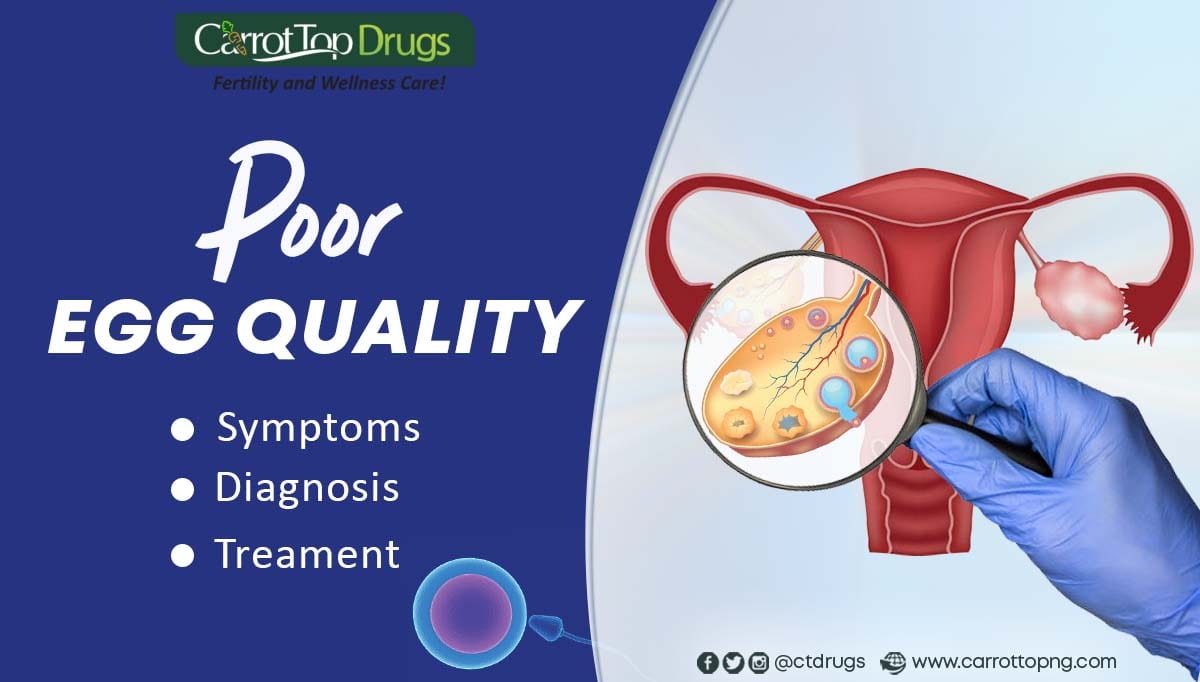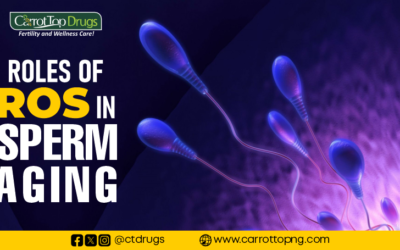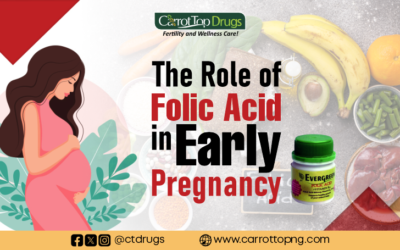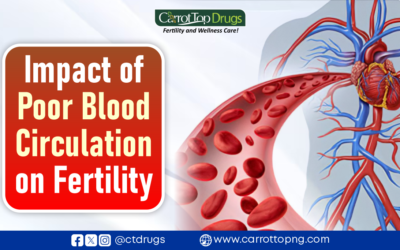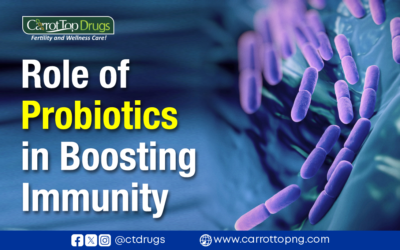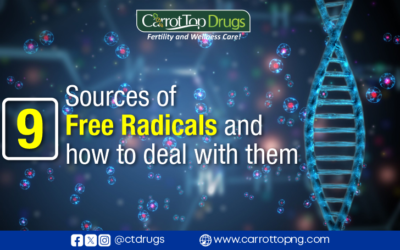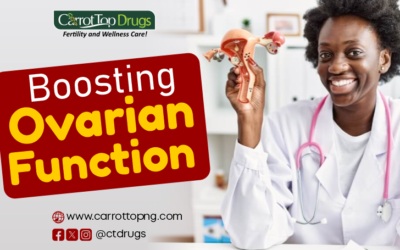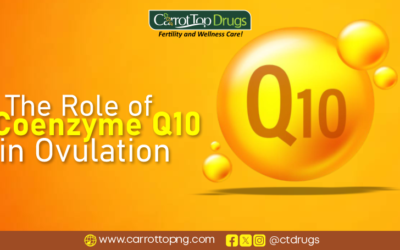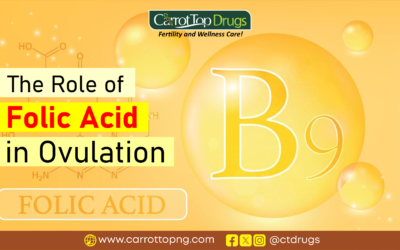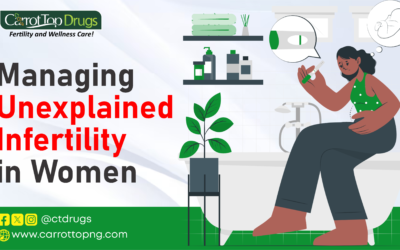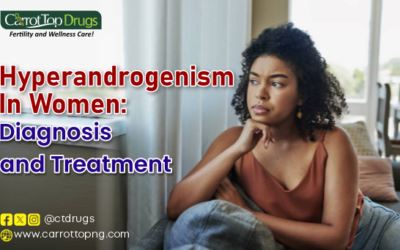Many couples may experience delay in getting pregnant due to poor egg quality. Poor oocyte quality makes fertilization of eggs challenging. This also affects the development of the egg into a healthy embryo. In our previous article, we thoroughly examined the causes of poor egg quality.
In this article, we would explore the symptoms and diagnosis. We also look into the most effective treatment methods available today.
What Are The Symptoms of Poor Egg Quality?
Aside from the age factor, there are several other symptoms of poor egg quality. Once you observe these symptoms, you need to reach out to your doctor as soon as possible. The symptoms include:
- Age:
As women age, their egg quality declines. Women over 35 years of age are at a higher risk for poor egg quality.
- Irregular periods:
Women with poor oocyte quality may have irregular periods. This makes it more difficult to predict ovulation and timed intercourse for optimal chances of conception.
- Low AMH levels:
Anti-Müllerian hormone (AMH) is a hormone produced by the ovaries. It can be used to estimate the number of eggs a woman has remaining. Low AMH levels may show poor egg quality.
- Abnormal follicle development:
Follicles are the fluid-filled sacs in the ovaries that contain the eggs. If the follicles develop abnormally, it may be a sign of poor egg quality.
- Poor response to fertility treatments:
If a woman undergoes fertility treatments such as IVF and does not produce many eggs or has a poor fertilization rate, it may be a sign of poor egg quality.
- Previous failed IVF cycles:
Women who have undergone IVF and have experienced many failed cycles may have poor egg quality.
It is important to note that some women with poor egg quality may still conceive naturally or with the help of fertility treatments.
How To Diagnose Poor Egg Quality?
Diagnosing poor egg quality can be a complex process. Your doctor may recommend a series of tests to evaluate your reproductive health and determine the underlying cause of your fertility issues. Some of the most common tests used include:
Ovarian Reserve Testing:
This test evaluates the quantity and quality of a woman’s remaining eggs. It involves measuring levels of follicle-stimulating hormone (FSH), luteinizing hormone (LH), and estradiol. This is usually done on day three of the menstrual cycle.
Ultrasound & Poor Oocyte Quality
Ultrasound can be used to assess the health of the ovaries and diagnose poor egg quality. It is a non-invasive procedure that uses sound waves to create images of internal organs, including the ovaries. An ultrasound can check for any abnormalities in the ovaries, such as cysts or other growths that may be impacting egg quality.
Ultrasound is used in diagnosing poor egg quality by counting the number of follicles in the ovaries. A high number of follicles may be an indicator that the ovaries are functioning well. While a low number of follicles may suggest poor ovarian reserve and poor egg quality.
Ultrasound can also be used to measure the size of the ovaries and to check for any abnormalities, such as cysts or tumors. These abnormalities can interfere with the development and maturation of the eggs.
Ultrasound can be a helpful tool in diagnosing poor egg quality, but, it is not always a definitive test. In some cases, women with apparently normal ultrasound results may still experience fertility issues related to poor egg quality.
Hormone Testing
Hormone testing is a crucial tool in diagnosing poor egg quality. It involves measuring the levels of various hormones that play important roles in the reproductive system. These hormones include follicle-stimulating hormone (FSH), luteinizing hormone (LH), estradiol, and progesterone.
FSH stimulates the growth and development of ovarian follicles, which contain eggs. High levels of FSH can indicate poor ovarian reserve and poor egg quality. While low levels may suggest a problem with the pituitary gland.
LH is responsible for triggering ovulation and the release of the mature egg from the follicle. Abnormal levels of LH can interfere with the maturation and release of the egg. This leads to poor egg quality.
Estradiol is a form of estrogen that the follicles produce. It is essential for the development of the egg. Abnormal levels of estradiol can interfere with the development of the egg, leading to poor egg quality.
Progesterone is produced after ovulation. It is important for preparing the uterus for implantation. Low levels of progesterone can interfere with implantation and may suggest poor egg quality.
Hormone testing can be done through a simple blood test. This is done at various points in the menstrual cycle depending on which hormone is being measured. For example, the physician measures FSH levels typically on the third day of the menstrual cycle. While estradiol levels are measured on the second or third day.
Hysterosalpingography (HSG)
This test involves injecting dye into your uterus and fallopian tubes and using X-ray imaging to check the flow of the dye. This can help your doctor identify any blockages or abnormalities in your reproductive system.
Genetic Testing
Genetic testing is an important diagnostic tool that can identify genetic disorders that cause poor egg quality. Your doctor may recommend this to you if you have a family history of genetic disorders. A woman who has experienced repeated miscarriages or failed IVF cycles, you may be asked to do this as well.
There are several genetic disorders that may cause poor egg quality. Some of them include
Turner Syndrome
Turner syndrome is a genetic disorder that affects approximately 1 in 2,500 females. Women with Turner syndrome have a missing or incomplete X chromosome. This leads to a variety of health issues, including ovarian dysfunction and poor egg quality.
Fragile X Syndrome
Fragile X syndrome is a genetic disorder that affects approximately 1 in 4,000 males and 1 in 8,000 females. It is caused by a mutation in the FMR1 gene, which can impact the development of eggs in women. Women who carry the Fragile X mutation may be at increased risk for premature ovarian failure and poor egg quality.
Genetic testing is an expensive procedure.
Egg Quality Testing
Egg quality is a crucial factor in female fertility. The quality of a woman’s eggs can directly impact her ability to conceive and carry a healthy pregnancy. One of the procedures is the egg retrieval procedure.
During an egg retrieval procedure, a fertility specialist will extract eggs from the woman’s ovaries using a minimally invasive surgical technique. This technique is transvaginal ultrasound-guided follicle aspiration. The eggs are then analyzed in a laboratory to determine their quality. This analysis typically includes an evaluation of the size, shape, and maturity of the eggs, as well as the presence of any abnormalities or genetic mutations.
Egg quality testing can be costly and invasive, and it may not be necessary for all women who are seeking fertility treatment.
What are the Treatment Options for Poor Egg Quality?
Poor egg quality can be a challenging condition to treat. There are several treatment options available to women struggling with this issue. Some of the most common treatment options include:
Make Lifestyle Changes
Poor egg quality can be a challenging issue for couples trying to conceive. However, adopting a healthy lifestyle can significantly improve the chances of healthy egg development.
A balanced diet that is rich in antioxidants, vitamins, and minerals can promote good egg quality. Antioxidants, such as vitamins C and E, help to protect the eggs from oxidative stress, which can cause damage to the DNA. Folate and B vitamins are also essential for healthy egg development. Foods that are rich in these nutrients include leafy greens, berries, nuts, seeds, and whole grains.
Regular exercise is also crucial for good egg quality. Exercise promotes blood flow to the reproductive organs, which can improve egg health. It also helps to reduce stress, which can negatively impact fertility.
Stress reduction is another important aspect of a healthy lifestyle for those with poor egg quality. Stress can cause hormonal imbalances that can negatively impact fertility. Finding ways to manage stress, such as through meditation, yoga, or counseling, can improve overall health and increase the chances of conceiving.
Smoking and alcohol consumption should be avoided for those with poor egg quality. Both smoking and alcohol reduce fertility and negatively impact egg quality. Quitting smoking and reducing alcohol consumption can improve the chances of conceiving.
Getting enough sleep is also essential for good egg quality. Lack of sleep can disrupt hormone levels and negatively impact fertility. Aim for 7-9 hours of sleep per night to promote healthy egg development.
Optimize Hormonal Balance
Hormonal imbalances can have a significant impact on egg quality and fertility. Low levels of thyroid hormones or high levels of insulin can negatively affect egg quality. Therefore, optimizing hormonal balance is an essential step for those with poor oocyte quality.
If you have a hormonal imbalance, your doctor may recommend some medications and/or lifestyle changes. This is to optimize your hormone levels.
For example, women with polycystic ovary syndrome (PCOS) could receive prescribed medication to help regulate insulin levels. You could also use Evergreen Formular for Women. This is a nutritional supplement that optimizes a woman’s hormonal level.
IVF
For some couples struggling with poor egg quality, in vitro fertilization (IVF) with egg donation may be the most viable option.
In this procedure, a donor provides eggs that are fertilized with sperm in the laboratory. The resulting embryo is implanted into the uterus of the recipient.
IVF with egg donation has been found to be more successful than using one’s own eggs in cases of severely compromised egg quality. This is because the donor eggs used in the procedure come from healthy young women with optimal egg quality. The use of donor eggs can increase the chances of successful implantation and live birth for couples with poor egg quality.
It is important to note that IVF with egg donation is a complex and expensive procedure, and not all couples may be able to afford it. However, for those who are able to undergo the procedure, it can be a viable option for starting a family.
See a Fertility Specialist
If you have been trying to conceive for a year without success, it may be time to consult a fertility specialist. Poor oocyte quality can be one of the reasons why you have been having difficulty conceiving. A fertility specialist can evaluate your egg quality and suggest personalized treatment options.
Once the specialist has evaluated your egg quality, they can suggest personalized treatment options that may include medications, lifestyle changes, or assisted reproductive technologies (ART) such as IVF or ICSI. For couples struggling with poor egg quality, the specialist may recommend IVF with donor eggs or embryo adoption.
It is important to note that fertility treatments can be expensive and emotionally challenging. The success rates can vary depending on the individual circumstances.
Consider Supplements
For couples struggling with poor oocyte quality, supplements may be an option to improve fertility. Coenzyme Q10 (CoQ10) is a popular supplement that improves egg quality in women over 35. Vitamin D is also essential for healthy egg development. Deficiency in this vitamin has been linked to infertility.
DHEA is another supplement that improves egg quality, particularly in women with diminished ovarian reserve. Myo-Inositol is a type of sugar that improves insulin sensitivity, which can positively impact fertility.
These very important active ingredients are present in our Evergreen Egg Boost Supplement. Evergreen EggBoost is a dietary supplement formulated to promote oocyte quality and ovarian function for women who are actively trying to conceive. It is a supplement from natural sources. Egg Boost can help to revitalize egg cells. It can also help to remove the harmful effects of free radicals due to its antioxidants.
In addition, supplements are relatively cheaper than other treatment methods. It is important to consult with a doctor before taking any supplements.
Conclusion
In this article, we have extensively looked at the symptoms, the diagnosis, and the treatments for poor egg quality. Check out blog posts for more fertility tips and follow us on our social media platforms as well.

